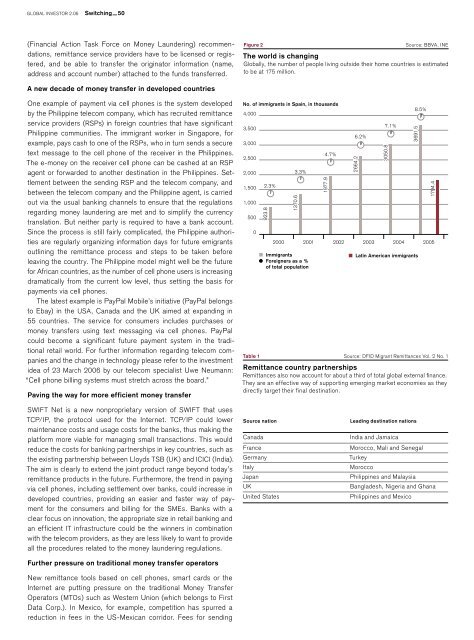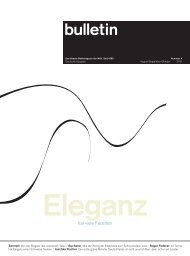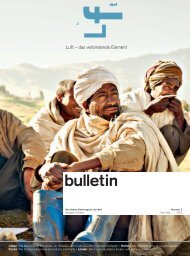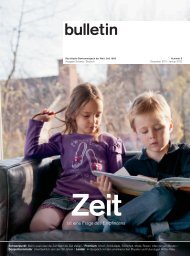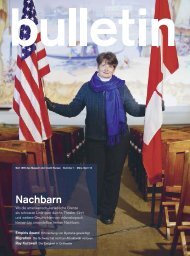International intellectual property
Globalization from a different angle Global Investor, 02/2006 Credit Suisse
Globalization from a different angle
Global Investor, 02/2006
Credit Suisse
Create successful ePaper yourself
Turn your PDF publications into a flip-book with our unique Google optimized e-Paper software.
GLOBAL INVESTOR 2.06 Switching — 50<br />
(Financial Action Task Force on Money Laundering) recommendations,<br />
remittance service providers have to be licensed or registered,<br />
and be able to transfer the originator information (name,<br />
address and account number) attached to the funds transferred.<br />
Figure 2 Source: BBVA, INE<br />
The world is changing<br />
Globally, the number of people living outside their home countries is estimated<br />
to be at 175 million.<br />
A new decade of money transfer in developed countries<br />
One example of payment via cell phones is the system developed<br />
by the Philippine telecom company, which has recruited remittance<br />
service providers (RSPs) in foreign countries that have significant<br />
Philippine communities. The immigrant worker in Singapore, for<br />
example, pays cash to one of the RSPs, who in turn sends a secure<br />
text message to the cell phone of the receiver in the Philippines.<br />
The e-money on the receiver cell phone can be cashed at an RSP<br />
agent or forwarded to another destination in the Philippines. Settlement<br />
between the sending RSP and the telecom company, and<br />
between the telecom company and the Philippine agent, is carried<br />
out via the usual banking channels to ensure that the regulations<br />
regarding money laundering are met and to simplify the currency<br />
translation. But neither party is required to have a bank account.<br />
Since the process is still fairly complicated, the Philippine authorities<br />
are regularly organizing information days for future emigrants<br />
outlining the remittance process and steps to be taken before<br />
leaving the country. The Philippine model might well be the future<br />
for African countries, as the number of cell phone users is increasing<br />
dramatically from the current low level, thus setting the basis for<br />
payments via cell phones.<br />
The latest example is PayPal Mobile’s initiative (PayPal belongs<br />
to Ebay) in the USA, Canada and the UK aimed at expanding in<br />
55 countries. The service for consumers includes purchases or<br />
money transfers using text messaging via cell phones. PayPal<br />
could become a significant future payment system in the traditional<br />
retail world. For further information regarding telecom companies<br />
and the change in technology please refer to the investment<br />
idea of 23 March 2006 by our telecom specialist Uwe Neumann:<br />
“Cell phone billing systems must stretch across the board.”<br />
Paving the way for more efficient money transfer<br />
No. of immigrants in Spain, in thousands<br />
4,000<br />
3,500<br />
3,000<br />
2,500<br />
2,000<br />
1,500<br />
1,000<br />
500<br />
0<br />
2.3%<br />
923.8<br />
1370.6<br />
3.3%<br />
2000 2001 2002 2003 2004<br />
Immigrants<br />
Foreigners as a %<br />
of total population<br />
1977.9<br />
4.7%<br />
2005<br />
Table 1 Source: DFID Migrant Remittances Vol. 2 No. 1<br />
Remittance country partnerships<br />
Remittances also now account for about a third of total global external finance.<br />
They are an effective way of supporting emerging market economies as they<br />
directly target their final destination.<br />
2664.2<br />
6.2%<br />
3050.8<br />
7.1%<br />
3691.5<br />
Latin American immigrants<br />
8.5%<br />
1794.4<br />
SWIFT Net is a new nonproprietary version of SWIFT that uses<br />
TCP/IP, the protocol used for the Internet. TCP/IP could lower<br />
maintenance costs and usage costs for the banks, thus making the<br />
platform more viable for managing small transactions. This would<br />
reduce the costs for banking partnerships in key countries, such as<br />
the existing partnership between Lloyds TSB (UK) and ICICI (India).<br />
The aim is clearly to extend the joint product range beyond today’s<br />
remittance products in the future. Furthermore, the trend in paying<br />
via cell phones, including settlement over banks, could increase in<br />
developed countries, providing an easier and faster way of payment<br />
for the consumers and billing for the SMEs. Banks with a<br />
clear focus on innovation, the appropriate size in retail banking and<br />
an efficient IT infrastructure could be the winners in combination<br />
with the telecom providers, as they are less likely to want to provide<br />
all the procedures related to the money laundering regulations.<br />
Further pressure on traditional money transfer operators<br />
New remittance tools based on cell phones, smart cards or the<br />
Internet are putting pressure on the traditional Money Transfer<br />
Operators (MTOs) such as Western Union (which belongs to First<br />
Data Corp.). In Mexico, for example, competition has spurred a<br />
reduction in fees in the US-Mexican corridor. Fees for sending<br />
Source nation<br />
Canada<br />
France<br />
Germany<br />
Italy<br />
Japan<br />
UK<br />
United States<br />
Leading destination nations<br />
India and Jamaica<br />
Morocco, Mali and Senegal<br />
Turkey<br />
Morocco<br />
Philippines and Malaysia<br />
Bangladesh, Nigeria and Ghana<br />
Philippines and Mexico


